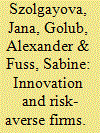| Srl | Item |
| 1 |
ID:
109342


|
|
|
|
|
| Publication |
2011.
|
| Summary/Abstract |
Ireland's Renewable Energy Feed-In Tariff (REFIT) for wind generation has some unusual features making it different from other REFIT schemes around the world. By utilising an annual floor price element the scheme presents an option value to the contract holder, which to date has gone unnoticed or unvalued in the market. By employing an option pricing framework, this paper has quantified for the first time in the public domain the expected costs and value of the Irish REFIT support scheme for wind generation. While the cost of the REFIT scheme to the electricity consumer appears to be lower than the cost of schemes in other countries, significant inefficiencies exist as a result of the structure of the scheme. The Irish REFIT scheme is contrasted with a single Fixed Price support scheme and the analysis suggests that the Fixed Price scheme can provide a similar or greater incentive to the wind sector at half the cost to the end electricity consumer, and may also prove more compatible with consumers desire to reduce inter-year electricity portfolio cost volatility.
|
|
|
|
|
|
|
|
|
|
|
|
|
|
|
|
| 2 |
ID:
132829


|
|
|
|
|
| Publication |
2014.
|
| Summary/Abstract |
In a regulated world where government seeks to decarbonize the energy sector, firms face both indirect and direct costs of emitting CO2. This study seeks to take the perspective of the firm, which needs to maximize profits implying minimization of (carbon) cost as well. In this study, the firm can compose the cost-optimal portfolio of (a) investing into carbon-saving technology, which is currently expensive, (b) investing into carbon-saving technology R&D and adopt this technology at a later point, (c) buying allowances per ton of emitted CO2 in a carbon market (alternatively this could be formulated as a tax), and (d) buying offsets traded in the same market, which are based on reduced emissions from deforestation and degradation (REDD+). Uncertainties in the cost of carbon coming from a lack of commitment in policy-making leading to fluctuations in markets and uncertainty in the payoff of R&D activities could provide disincentives to incur large up-front sunk cost and raise the economic value of being flexible. We apply a real options approach with stochastic carbon-saving technology costs and stochastic CO2 costs. Assuming that firms are risk-averse, they will not only value flexibility, but also risk reductions from diversification over the different (carbon mitigation) options.
|
|
|
|
|
|
|
|
|
|
|
|
|
|
|
|